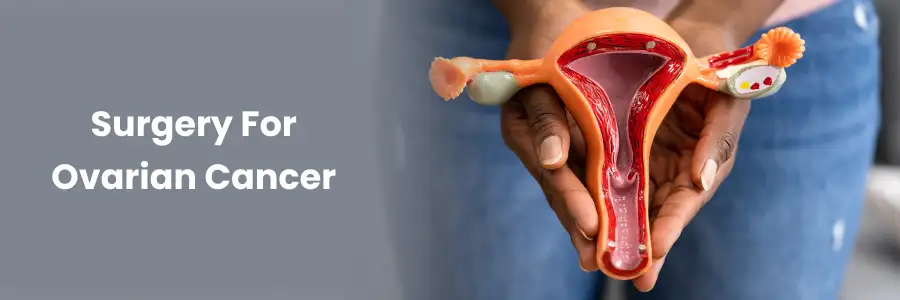- Cardiology 84
- Dermatology 45
- Endocrinology 33
- ENT 16
- Fertility 190
- Gastroenterology 78
- General-Medicine 81
- Gynecology 80
- Hematology 19
- Infectious-Diseases 33
- Neurology 52
- Oncology 34
- Ophthalmology 23
- Orthopedics 69
- Pediatrics 31
- Procedure 23
- Public-Health 144
- Pulmonology 59
- Radiology 8
- Urology 68
- Wellness 161
- Woman-and-child 77

Surgical Options for Treating Ovarian Cancer
Ovarian cancer is a serious condition affecting many women globally. Early detection and treatment are crucial for improving outcomes. One of the primary ovarian cancer treatment types is surgery. This article will explore the various surgical options for ovarian cancer, highlighting the benefits and what patients can expect.
Secure your health with a second opinion. Make informed decisions and book your appointment today!
Get A Second OpinionImportance of Surgery in Ovarian Cancer Treatment
Surgery plays a vital role in both diagnosing and treating ovarian cancer. It helps to determine the stage of cancer, remove tumors and reduce the number of cancer cells. The goal is to remove as much of the cancer as possible, a process known as debulking. Surgery is often combined with other treatments such as chemotherapy for better outcomes in ovarian cancer surgical treatment.
Types of Surgical Procedures for Ovarian Cancer
There are several surgical methods for ovarian cancer, each stage and spread of the disease. Below are the most common ovarian cancer surgery details:
Hysterectomy
A hysterectomy involves removing the uterus. There are two types:
- Total Hysterectomy: Removal of the uterus and cervix.
- Subtotal Hysterectomy: Removal of the uterus, leaving the cervix.
For ovarian cancer spread, a total hysterectomy is often recommended as part of ovarian cancer operation choices.
Oophorectomy
An oophorectomy is the removal of one or both ovaries. Types include:
- Unilateral Oophorectomy: Removal of one ovary.
- Bilateral Oophorectomy: Removal of both ovaries.
This procedure helps reduce the spread of cancer confined to the ovaries and is a key ovarian cancer surgery option.
Salpingectomy
A salpingectomy involves removing one or both fallopian tubes, often combined with a hysterectomy and oophorectomy. This procedure is recommended when cancer has spread to the fallopian tubes and is part of surgical procedures for ovarian cancer.
Cytoreductive Surgery
Cytoreductive surgery, also known as debulking, aims to remove as much tumor mass as possible, usually when cancer has spread within the pelvic region. The smaller the remaining tumor, the more effective subsequent treatments like chemotherapy will be, forming a crucial part of treating ovarian cancer surgery.
Lymph Node Dissection
Lymph node dissection involves removing lymph nodes from the pelvis and abdomen to check for the spread of cancer, aiding in ovarian cancer treatment types.
Minimally Invasive Surgical Techniques for Ovarian Cancer
Recent advances have led to minimally invasive surgical methods for ovarian cancer, involving smaller incisions that allow quicker recovery times.
Laparoscopy
Laparoscopy is a minimally invasive surgery where small incisions allow the insertion of a camera and instruments. This technique is common for staging and sometimes tumor removal in surgical methods for ovarian cancer.
Robotic-Assisted Surgery
In robotic-assisted surgery, robotic arms perform high-precision surgery under the surgeon's control. This surgical procedure for ovarian cancer can lead to better outcomes and shorter recovery times.
Benefits of Surgery for Ovarian Cancer
Ovarian cancer surgery benefits include:
- Improved Survival Rates: Removing tumors can improve survival rates, especially when combined with treatments like chemotherapy.
- Accurate Staging: Surgery helps determine the exact stage of cancer, allowing for treatment plans.
- Symptom Relief: Surgery can relieve symptoms such as abdominal pain, improving the patient's quality of life.
Preparing for Surgical Treatment of Ovarian Cancer
Before surgical procedures for ovarian cancer, patients undergo:
- Medical Evaluation: Blood tests, imaging studies and consultations help determine the best surgical methods for ovarian cancer.
- Preoperative Instructions: These include fasting and medication guidance.
- Emotional Support: Surgery can be emotionally challenging, so support from family and professionals is crucial.
Recovery After Ovarian Cancer Surgery
Recovery varies based on the type of surgery performed. Here are general guidelines for ovarian cancer operation choices:
- Hospital Stay: Patients may stay in the hospital for a few days to a week.
- Pain Management: Doctors prescribe pain relievers and may recommend therapies.
- Follow-Up Care: Regular follow-ups are essential to monitor recovery and check for recurrence.
Ready to take control of your health journey? Book your appointment now and start your path towards wellness today!
Book an AppointmentConclusion
Surgery is a cornerstone in treating ovarian cancer. Understanding the various ovarian cancer surgical options and their benefits helps patients make informed decisions. With advancements in surgical procedures for ovarian cancer, outcomes and quality of life for those affected have significantly improved.
Frequently Asked Questions
Common surgical options include oophorectomy, hysterectomy, and debulking surgery to remove cancerous tissues.
Surgery is often the first line of treatment for ovarian cancer, followed by chemotherapy or other treatments if necessary.
Surgery can help remove as much of the cancer as possible, improving the effectiveness of subsequent treatments.
Post-surgery recovery may involve hospitalization, pain management, and monitoring for any complications or infections.
Yes, surgeries vary depending on cancer stage, including minimally invasive techniques and more extensive procedures like debulking.

- Cardiology 2132
- Dermatology 168
- Endocrinology 135
- ENT 97
- Fertility 217
- Gastroenterology 232
- General 478
- General-Medicine 1685
- Gynecology 169
- Hematology 85
- Infectious-Diseases 208
- Neurology 207
- Oncology 345
- Ophthalmology 65
- Orthopedics 187
- Pediatrics 83
- Procedure 72
- Public-Health 209
- Pulmonology 126
- Radiology 13
- Second Opinion 311
- Urology 294
- Wellness 600
- Woman-and-child 447
- Others 10217
Related Blogs
If you have any questions, please fill out the enquiry form or call us, and we will get back to you promptly.
040-68334455